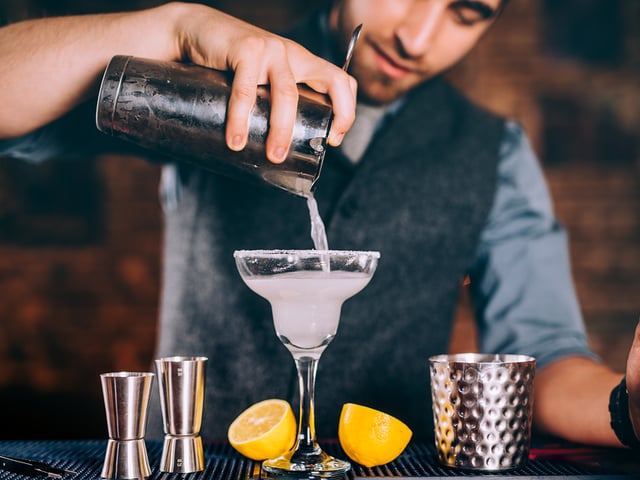
Bartender Basics
Bartending is an incredibly social occupation that also requires a great degree of knowledge, a good memory, and the right attitude. Being a truly great bartender requires a unique mix of these traits and skills; however, there are a few other things to keep in mind in this line of work.
-
You will have to establish boundaries on a regular basis. Unlike most other professions, bartending provides a setting in which social interactions comprise the majority of the workday and the customers may not always be of sound mind. It will be up to you to set social boundaries, avoid romantic encounters with customers, and refrain from disclosing personal information.
-
Always check IDs. To bartend legally, you must ensure all patrons are of age. Even if they look much older than the legal age, the safest course of action is to require IDs for everyone, ensuring full compliance with the law.
-
Obey laws that prohibit serving to already intoxicated persons. Some bartenders are reluctant to deny service to someone who is clearly intoxicated in the hope that they may make more in tips. But many states have laws prohibiting this, and the bartender may be held liable for damages if he or she was negligent in this duty.
-
Do not allow an intoxicated person to drive. It is impossible for a bartender to control the actions of any individual, but awareness of intoxication means the bartender must make reasonable efforts to prevent that customer from driving. This would include calling a cab or ride-sharing service, or calling the police to report the individual if they cannot be dissuaded.
-
You can refuse service to anyone. In addition to legal concerns, bartenders must also be vigilant in ensuring physical safety. Customers that have been drinking and are in social settings may, at times, become hostile. Refusing service to disruptive customers is often the best course of action for diffusing a tense or potentially dangerous situation. If it escalates, do not hesitate to call the proper authorities. Nobody should feel unsafe in their workplace.
-
It is up to YOU to know the laws and obey them. Often, different states have varying laws and penalties. Ultimately, it is up to the bartender to stay up-to-date on current law and ensure that they are upholding it diligently.
-
Civil and criminal liabilities can be personal. It may seem logical to think that if an error or violation is made while bartending, only the establishment would be liable. This is not true. A civil liability can be personal and the bartender may be found directly responsible for any damages. Criminal liability also applies to servers when legal violations occur. This can result in a permanent criminal record, depending upon the severity of the violation.
-
You must report your tips. One of the major perks of bartending is that it provides the ability to walk out with cash tips at the end of every shift. But just because it’s not on your paycheck, doesn’t mean that it isn’t taxable. You are required to report your full income, including tips.
Bartending can be a lucrative job for the right type of person, and there is nothing wrong with genuinely enjoying interactions and having fun with what you do. Just keep these tips in mind to ensure that you are protecting yourself, the establishment, and your customers. In the long run, this is a much better recipe for success!
Keep Reading

ServSafe Food and Alcohol Safety Exams Blog
How Long Does ServSafe Certification Last?
The ServSafe certification is a critical credential for professionals i…

ServSafe Food and Alcohol Safety Exams Blog
The Big Eight Food Allergens are Now the Big Nine
An allergen is typically a harmless protein that, for some, the immune …

ServSafe Food and Alcohol Safety Exams Blog
ServSafe Food Handler vs. ServSafe Manager: Which Course is Right for You?
The food service industry requires stringent adherence to safety and hy…